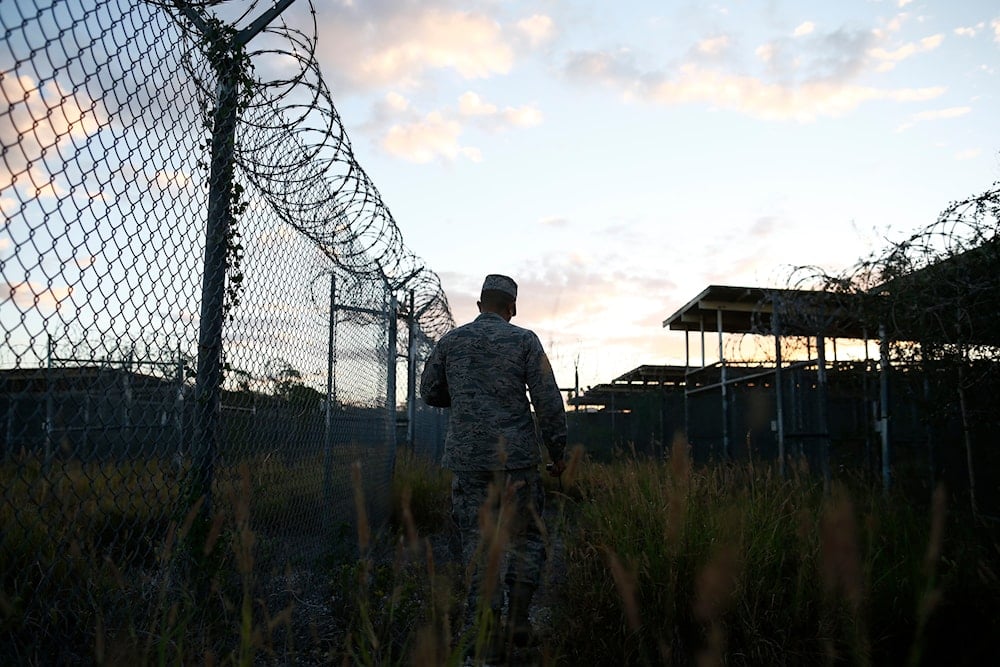UK faces legal challenge over role in CIA torture program
Two Guantanamo Bay detainees are challenging the UK government in a rare four-day hearing, accusing British intelligence of complicity in CIA-led torture at black sites following 9/11.
-

Holding pens are overgrown with foliage in the now-abandoned Camp X-Ray at Guantanamo Bay Naval Base, Cuba, on November 21, 2013. (AP)
The UK government’s long-standing efforts to suppress details of its intelligence agencies’ involvement in the CIA's post-9/11 torture program face a historic challenge this week, an investigation by The Guardian revealed, as two Guantanamo Bay detainees bring claims before a secretive British court.
The Investigatory Powers Tribunal (IPT), operating behind closed doors, will hear the cases in a rare four-day trial beginning Tuesday. The tribunal has been investigating allegations that UK intelligence services were complicit in the abuse and mistreatment of prisoners held in the CIA’s global network of secret detention sites, commonly known as black sites.
According to The Guardian, the legal claims were filed by Mustafa al-Hawsawi and Abd al-Rahim al-Nashiri, two high-profile detainees held at Guantanamo Bay. The US accuses Hawsawi of supporting the 9/11 hijackers, while Nashiri is alleged to have plotted the 2000 bombing of a US naval vessel. Both men were captured in the early 2000s and detained in CIA black sites where they were subjected to what has widely been condemned as torture. Techniques reportedly included "rectal feeding," which medical experts have classified as sexual assault.
In 2006, after years of CIA detention, both men were transferred to Guantanamo Bay, where they remain. Despite facing charges that carry the death penalty, neither of their cases has proceeded to trial in the special US military court.
Evidence links MI6 to CIA interrogation tactics
Lawyers representing the detainees argue there is credible evidence that British intelligence agencies, MI5 and MI6, unlawfully aided and abetted the US in carrying out torture. According to the claims presented to the IPT, UK agencies allegedly encouraged, facilitated, or conspired with the CIA in the mistreatment of prisoners.
In one significant development, a declassified CIA cable from 2003 revealed that while Hawsawi was being tortured at a black site in Afghanistan, US interrogators were instructed to "press" him for information regarding alleged terrorist activities in the UK, according to the investigation.
Read next: Dark history: How the US experimented on its own people
The cable, though publicly released in 2017, was recently identified by Unredacted, a research group at the University of Westminster. The timing and content of the message have raised new questions about whether British intelligence was feeding questions to the CIA while being aware of the torture.
Sam Raphael, director of Unredacted, said the evidence indicated "a clear interest in interrogating Hawsawi about specific UK-based operatives and plots at a time when he was being subjected to the worst kind of treatment." He added, "It raises an obvious and important question the tribunal should address: was British intelligence, which we know was directly and deeply involved in post-9/11 prisoner abuse, feeding the questions to the CIA?"
IPT hears claims of British role in black site programme
According to The Guardian, the IPT investigated the claims for the past two years, while the court’s ability to examine such allegations is rare, and its involvement in this case marks a new level of judicial scrutiny over what many consider one of the darkest periods in British intelligence history.
Chris Esdaile, a senior legal advisor at Redress, an NGO supporting victims of torture, described the trial as "unprecedented," stating, "Until now, efforts to lift the veil of secrecy and consider the full extent of the UK’s involvement in the CIA’s black site programme have been thwarted."
The hearing also revives criticism of the UK government’s decision to abandon a public inquiry into alleged complicity in torture. However, former Prime Minister David Cameron initiated the inquiry in 2010, promising transparency, but it was quietly shelved in 2019 despite mounting evidence and calls for accountability.
Additionally, in its 2018 report, Parliament’s Intelligence and Security Committee confirmed that British officers had engaged in "inexcusable" actions, with hundreds of cases of mistreatment and dozens of renditions. However, it stressed that its inquiry was "terminated prematurely" due to obstruction by ministers and intelligence officials, leaving critical questions unanswered.

 4 Min Read
4 Min Read










